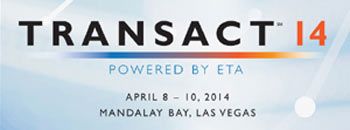ELECTRONIC TRANSACTIONS ASSOCIATION ANNOUNCES WINNERS OF THE 2014 ETA STAR AWARDS
Published by Gbaf News
Posted on April 17, 2014
3 min readLast updated: January 22, 2026

Published by Gbaf News
Posted on April 17, 2014
3 min readLast updated: January 22, 2026

Star Awards recognize individuals and companies making significant contributions to the payments industry
The Electronic Transactions Association (ETA), the global trade association representing the payments technology world, has announced the winners of its prestigious ETA Star Awards. Presented at the President’s Dinner & Star Award Gala during TRANSACT: Powered by ETA, the world’s largest payments industry event, the awards recognize and showcase individuals and companies that have made a significant difference in the payments industry, through innovation, business practices or contributions to the association.
This year the ceremony also featured two brand new awards: ISO of the Year – Rising Star, and Member of Congress – Payments Industry Leader.
 Jason Oxman CEO at ETA commented, “The ETA Star awards, including the new Rising Star – ISO of the Year award, symbolize a tradition of excellence and commitment in the payments industry. This year we’ve recognized and celebrated creativity and innovation that is truly moving the payments industry forward. I’m thrilled to see a range of companies including Anovia Payments, Security Metrics, North American Bancard and Cardflight all acknowledged for their high standards and commitment to excellence.”
Jason Oxman CEO at ETA commented, “The ETA Star awards, including the new Rising Star – ISO of the Year award, symbolize a tradition of excellence and commitment in the payments industry. This year we’ve recognized and celebrated creativity and innovation that is truly moving the payments industry forward. I’m thrilled to see a range of companies including Anovia Payments, Security Metrics, North American Bancard and Cardflight all acknowledged for their high standards and commitment to excellence.”
The Payments Industry Leader award, presented to a Member of the U.S. House of Representatives and to a Member of the U.S. Senate, recognizes government officials who have taken a leadership role in supporting policies that advance payments industry innovations. Senator Tom Carper and Representative Shelly Moore were this year’s recipients.
Senator Carper is a bipartisan leader on data security and breach notification in Washington, D.C. His bill, the Data Security Act of 2014 would help better protect consumers from identity theft and account fraud and would establish a clear and consistent preemptive federal law for public and private institutions to follow to prevent and respond to data breaches.
Representative Shelley Moore Capito serves as the Chairwoman of the Financial Institutions and Consumer Credit Subcommittee of the House Financial Services Committee. She is working to ensure competitiveness for U.S. businesses and bring accountability and transparency to government regulation of financial institutions and those in the payments industry
This year’s Award Winners were Distinguished Payments Professional – Pamela Joseph, Vice Chairman, Payment Services, of U.S. Bancorp, Business Partner of the Year – Security Metrics, Committee of the Year – Transact Program Planning, Committee Volunteer of the Year – Scott Goldthwaite, Roam, ISO of the Year – North American Bancard, Member of the Year – Mike Strawhecker, The Strawhecker Group, Technology Innovation – Cardflight, ISO of the Year, Rising Star – Anovia Payments, and Member of Congress, Payments Industry Leader – Representative Shelley Moore Capito and Senator Tom Carper.
The ETA Star Award recipients are featured in the annual meeting follow-up issue of Transaction Trends, the official publication of ETA and the best source for thoughtful, in-depth reporting on the electronic payments industry.
About ETA
The Electronic Transactions Association (ETA) is the global trade association representing more than 500 payments and technology companies. ETA members make commerce possible by processing more than $4.5 trillion in purchases in the U.S. and deploying payments innovations to merchants and consumers.
Explore more articles in the Top Stories category











